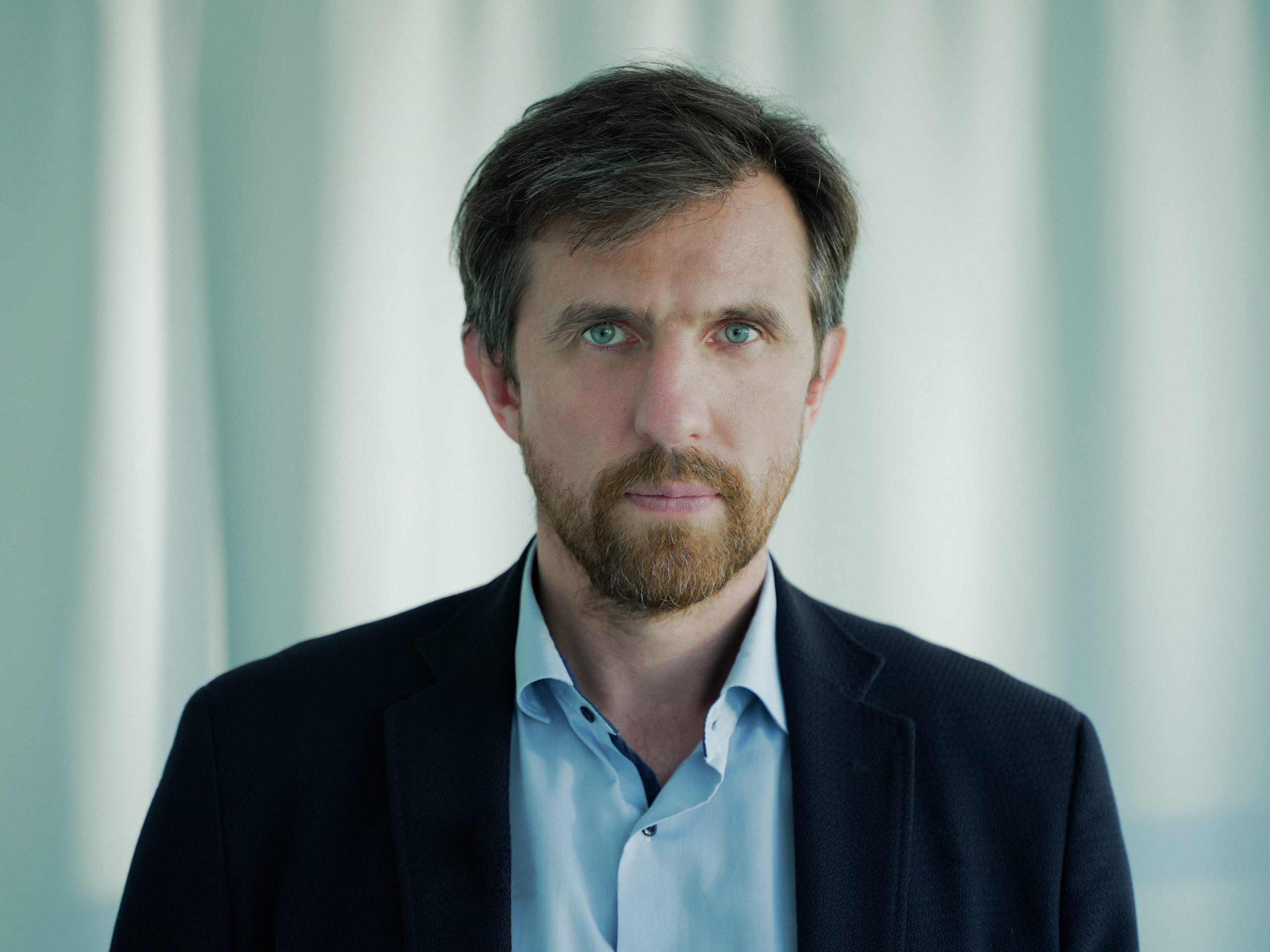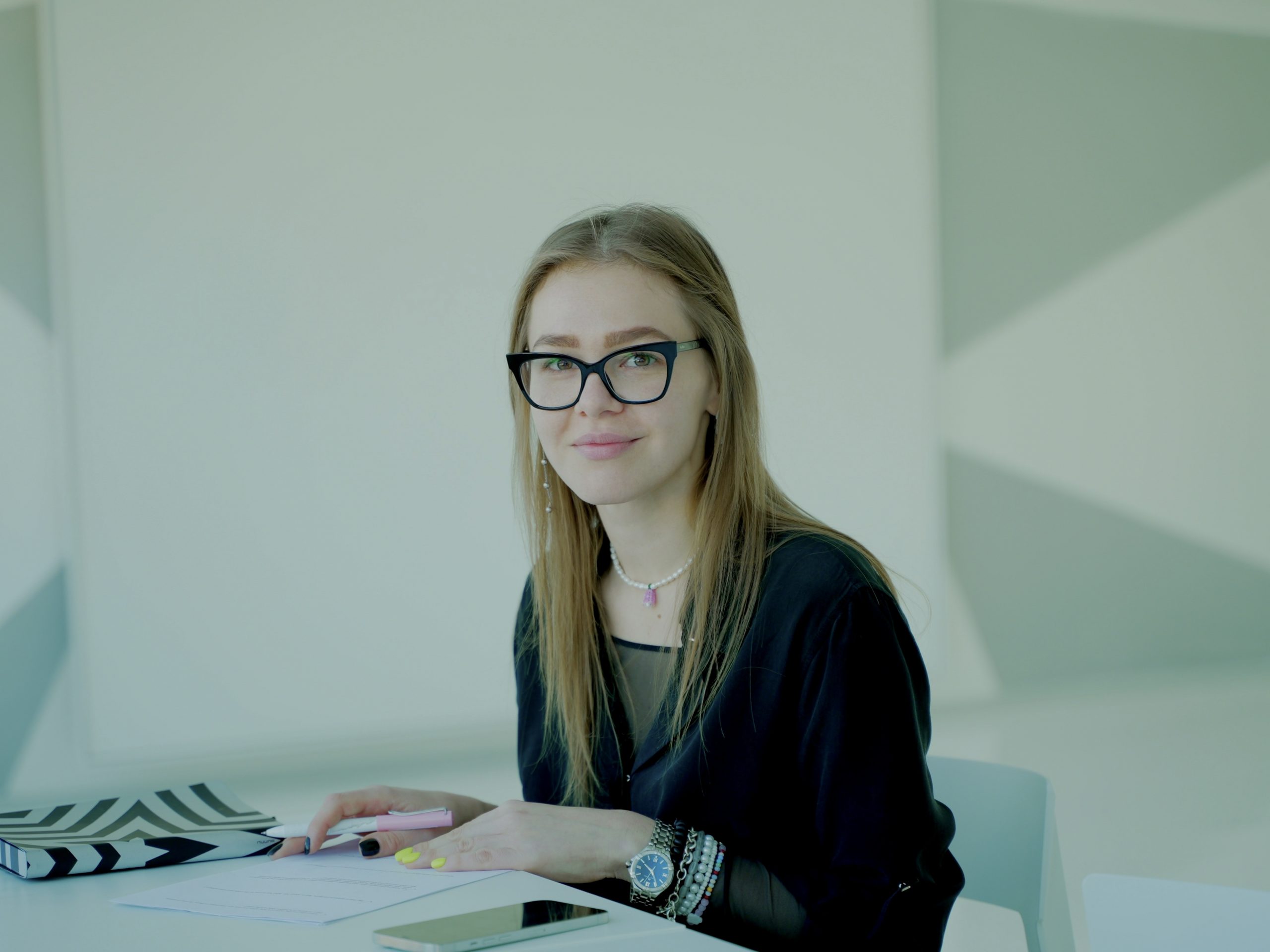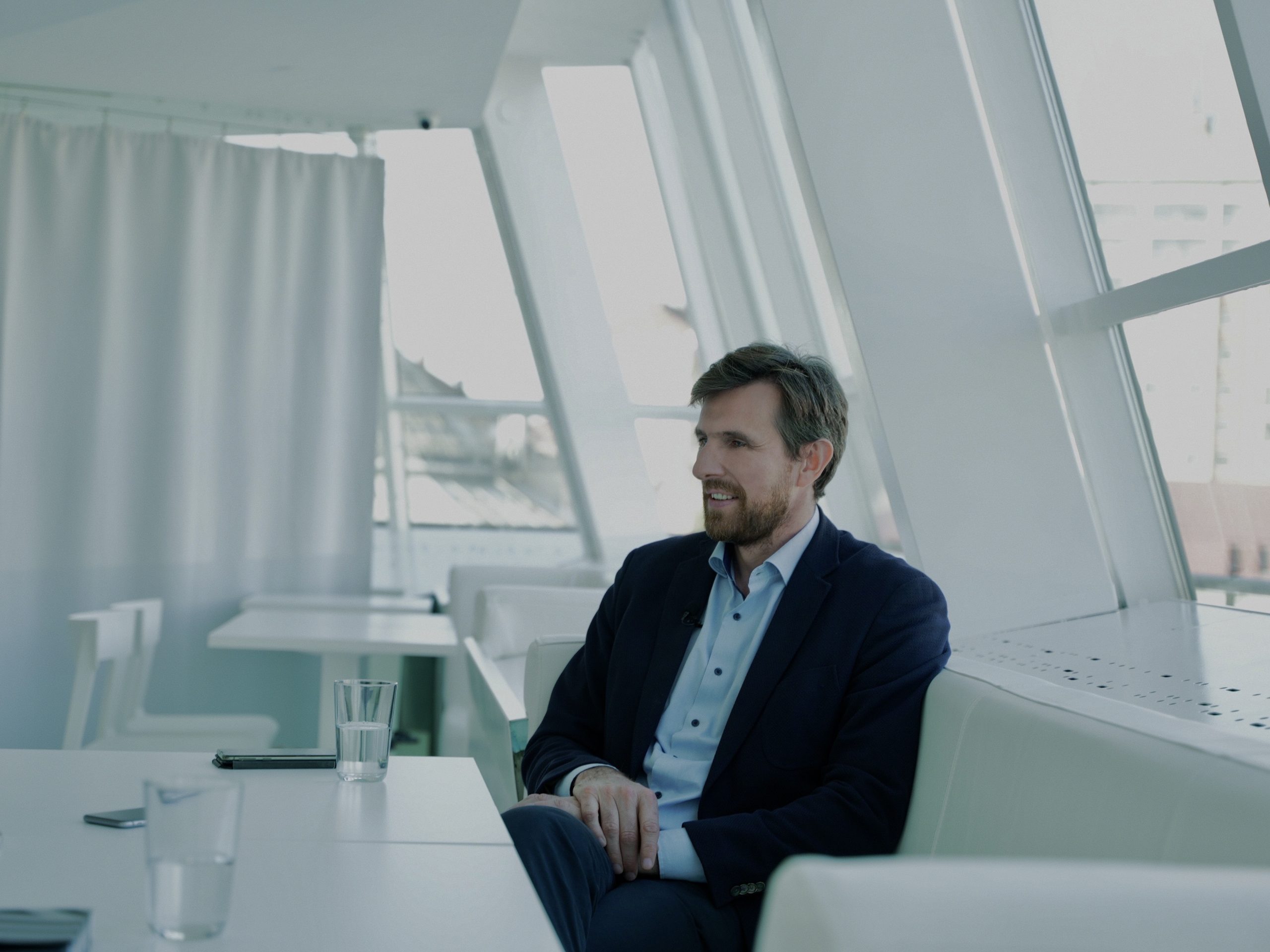Talk to Me Anna Vovk
Bjorn Geldhof

Bjorn Geldhof: «Honesty is the main thing I pay attention to in an artist»
At the end of September, the Future Generation Art Prize 2021 exhibition opened at the PinchukArtCentre and will run until the end of February. The exhibition features 21 works by the shortlisted artists. We will find out who the winner of the competition is in December. In the meantime, Anna Vovk talked to the art director of the PinchukArtCentre, Bjorn Geldhof, about choosing the best applicants out of 12 thousand applications, about the best part of Europe, and plans for the next life.
Let’s start from the very beginning. How did it happen that you came to Kyiv in the first place?
The first person who told me about Kyiv was Eckhard Schneider, back then the General Director of the PinchukArtCentre. I worked with him on the Jan Fabre exhibition at the Kunsthaus Bregenz, which Eckhardt also directed at the time. Schneider is an incredibly charismatic person, he taught me a lot, and I wanted to work with him in the future. As it turned out, Eckhard also had a good opinion of me and once asked if I was interested in Kyiv. He was going to head the new PinchukArtCentre and invited me to come. It was 2008, the opening of Damien Hirst’s exhibition. In Kyiv, I was struck by two things: absolutely crazy energy, which you don’t really find in Western Europe, and the interest of young people in art. In front of the entrance to the center, long queues of young people lined up. There was a completely different audience, and I had to work for them and with them.
Soon I met Victor Pinchuk – a person who thinks outside the box, who had the courage, understanding, and resources to do something truly extraordinary. He was also confident that he could transfer the gallery into the hands of those he trusted. One of these people turned out to be Eckhard Schneider. I was 29 years old then – at this age, one does not refuse new opportunities.
Okay, have you ever thought about leaving Kyiv?
I can’t say that I never thought about it. I thought, and once even tried to leave, but sort of failed. Like many people after the Revolution of Dignity, I wanted something new in my life. At about the same time, in 2015, I received an offer from Azerbaijan (Geldhof served as the artistic and strategic director of the Yarat! Contemporary Art Center in Baku. – Ed .). And when I told Viktor Pinchuk that I would like to try, he supported me, but on the condition that I did not leave my job in Kyiv.
And you spent three years in Azerbaijan?
Yes, I lived in two cities. That was great! Sometimes we just need to change the place, the air we breathe, create a different reality, that we want to return to. I remember well the day when my friend in Kyiv was having a small dinner. I arrived from the airport to the city a little earlier, I had time before dinner, and I decided to take a walk from the PinchukArtCentre. It was then that I felt that something had changed, Kyiv had become different. I always said that it was part of Europe, but emotionally I felt a certain distance. And that day, on my way to dinner, I thought that this is not just a part of Europe, but the best part of it. Then I decided to return here and not to leave again.
And in Ukraine, in Kyiv, is it difficult to be an expat?
I sincerely believe that we have a good life. I travel a lot, I am surrounded by wonderful people who are ready to help with any questions. Also, I don’t have to do paperwork. I have nothing to complain about. Except for the lack of cultural experiences – theatrical performances, great opera, fantastic ballet, and classical music performed at a very high level. But again, I travel a lot and there are tons of other things to do here.
I was just about to ask about your interest in theater. Did you ever perform on stage?
I have been a theater director for a long time. I began to play as a teenager, at the age of 14 created my own theater troupe and led it until the age of 18. Then when I entered the university, there was already a theater troupe, and I became its director.
Did you study law at university?
I never actually became a lawyer. I was attracted to theater direction, but my parents were categorically against it. I did not argue with them and decided to study law, which, by the way, still interests me. My parents were happy, but literally, at the last minute, I changed my mind and changed my jurisprudence to visual art. Therefore, the law remained a dream.
But not your dream, right?
Who knows, life is long (laughs).
Let’s go back to the PinchukArtCentre. At some point, its activities switched mainly to local content. Can we say that now the only investment in foreign art is the Future Generation Art Prize?
I don’t think this is the case. The focus of the work has changed several times. We started with strong international exhibitions that gave Ukrainians access to art that they would hardly have seen abroad because traveling was more difficult then than it is now.
For the first time, the strategy changed dramatically in 2014–2015. We wanted to focus on thematic exhibitions related to the political context in Ukraine, but also present well-known foreign artists. We had two awards – the Future Generation Art Prize and the PinchukArtCentre Art Prize. And then the research platform emerged, which became the first serious contribution to the study of Ukrainian art.
We are now moving from three main areas of activity to two. We work with young emerging artists, not only within the Future Generation Art Prize but in all our programs related to international exhibitions. And, of course, Ukrainian art, to which our main investments are directed, in terms of both research and exhibition activities.
Could you highlight the most popular themes that artists cover this year as part of the Future Generation Art Prize?
Most of them are looking for an answer to the question of what the world should be like. All artists have their own vision, but the feeling at the exhibition does not leave that each work, in one way or another, is a reflection on the possibilities of tomorrow, on how to make the world a better place, on the connection with the past and how it defines what/where we are now.
Do you have a favorite artwork from the competition?
Yes, but as a member of the jury, I have no right to answer this question, even without the dictaphone turned on.
Then tell me about your criteria?
We appoint a jury, which in turn appoints a selection committee. I always ask the committee to define its own assessment criteria. All we give them is the name of the Future Generation Art Prize. Therefore, this is the main question for the participants in the discussion – what the future generation means for you. And then seven international experts come to a common vision of what they consider important for today.
It’s amazing that over the past 12 years, everything has been done differently every time. And the nominees for the first prize would hardly look organic among the nominees of this year. The times have changed and the problems have changed. This shows the rapidly changing world we live in.
But do you usually choose the jury yourself?
Yes, this is my job.
And the members of the jury are new every year?
The principle of jury formation is quite simple. They are always internationally established professionals who can judge impartially. They do not choose certain artists because they work with them. Not all members of the jury, unlike members of the selection committee, are well acquainted with the younger generation of artists. And double selection helps here.
We represent all nominees at the Venice Biennale. Of course, the winner is very important, but each of the 21 artists is not accidental.
That is, all the participants will be represented in Venice?
Yes, everyone will be seen in Venice.
How many applications were there this year?
Almost 12 thousand applications from 181 countries.
So many. Are you doing some kind of preliminary selection?
Yes. It is needed if only because there are non-professionals among the participants, and it is impossible to determine them without a clear assessment system. Each member of the selection committee puts a plus on potentially interesting work for discussion. The committee has only seven people. This means that every artist who receives three or more votes goes to the next stage.
And how long does it usually take, a month?
We have been communicating on zoom for several weeks. We have never received so many applications before – as a rule, there were six thousand. Now the number has doubled, and the average level of participants has become higher. We had a lot to discuss.
Tell us about your favorite museums and galleries.
I have no favorite places. There are those where I go for different reasons, but the only gallery where I feel at home is the PinchukArtCentre. Here you can do what you want without compromise, and these are the places that interest me. Do I always like exhibitions? No. But will I always go there? Definitely yes, because at least it’s curious.

Which exhibition at the PinchukArtCentre was the most difficult for you?
Perhaps the exhibition of Boris Mikhailov. Boris is an incredible artist and maniac in the best sense of the word when it comes to organizing an exhibition. He is such a sensitive person that his reaction to the world around him is sometimes very unpredictable. But this is the case when the end result, despite all the difficulties, is amazing.
You said that your acquaintance with Viktor Pinchuk influenced the decision to stay in Kyiv. How much influence does he have on everything that happens at the PinchukArtCentre?
Pinchuk is the reason why everything happens, so it is difficult to underestimate his importance. In a changing political situation, he managed to keep the institution open and independent. We have never experienced any pressure or restrictions on his part. For him, art is freedom, something that develops and changes people’s thinking, an opportunity to make the world around them better and to do it in their own country.
Are there any rules that can help young artists get noticed?
First rule: be honest in your art and don’t look at what others are doing, otherwise you will lose your creative freedom. Do not be afraid to do what you are not sure about. Make a mistake. Failures are the best way to grow. Also, learn to talk about your work and what you wanted to say about it. This is very important nowadays.
I wonder how an artist can get your attention?
The honesty of the artist. Honesty is the main thing that I pay attention to. This is where you discover something new for yourself. And also – ambition, the desire to reach the limit in creativity, because you have something to say and your work has a mission. Honesty, uncompromising, and the right ambitions – all this makes the dialogue with the artist very interesting.
In your opinion, is it possible to become a good curator without special education?
It is difficult to be a good curator if you do not understand what is happening in the world, if you do not know the history of art and if there is no intellectual base that helps to talk about art. But if you came to art, for example, with a technical education, you can arrange great exhibitions.
A curator can always develop professionally. The more you learn, the more artists you know and the better you understand how artists create artworks, the better you will do your job.
I like to ask this question to fascinating individuals: If you could live one more life, what would you like to do besides art?
I would choose a profession in which imagination and the future are important. As, for example, in the theater, in creating exhibitions, managing museums. Being curious and using all knowledge to develop something new, important for people – that’s what attracts me.
What do you usually read and what kind of news do you watch?
I don’t watch the news – I read them. As a rule – three newspapers a day. I also read three books at the same time, which makes it possible to think differently and develop imagination. One of them is science fiction. The second book I’m reading now is Graham Harman. Thanks to him, you think about how we are all connected to each other and to the world around us, and this really helps in our work. The third book is “Neighbors. The History of the Destruction of a Jewish Town ”by the Polish writer Jan Tomasz Gross.

You seem like a person who has no time for themselves at all. What would you do if you had more free time?
I would like to have time for doing nothing and the opportunity to think calmly, without being distracted by everyday matters. Just walk in the garden, admire my home, take my time with a cup of coffee or tea. Amazingly, we take a long time to start allowing ourselves to do nothing. At least a working week should pass before that.
Sometimes I think it would be great not to do anything at a certain time of the year. But I am a father of four and I have a responsible job, so I will most likely have to wait. Well, or force myself to do nothing. Although up until now I have not succeeded (laughs).
News
-
![["Welcome Day #KAMA19"]]()
Welcome Day #KAMA19
Welcome Day is an opportunity to look inside of KAMA, learn about how and when studying takes place, meet our curators, evening program coordinators and the Academy team.
-
![["Final of the Сopywriting grant course"]]()
Final of the Сopywriting grant course
-
![["Recruitment for the Copywriting grant program for war victims"]]()
Recruitment for the Copywriting grant program for war victims
-
![["KAMA STARTED COOPERATION WITH BAUHAUS"]]()
KAMA STARTED COOPERATION WITH BAUHAUS
-
2022-06-21 20:00:00
![["WEBKAMA Talks: Mykhailo Gusarov"]]()
WEBKAMA Talks: Mykhailo Gusarov
Mykhailo Gusarov is a Ukrainian screenwriter with extensive experience in television and a participant of War Against War.
-
2022-05-19 20:00:00
![["WEBKAMA Talks: Mykhailo Rud"]]()
WEBKAMA Talks: Mykhailo Rud
Creative producer and screenwriter at the IQ Production studio. Director of the short film "Typical Problems"
-


![["Welcome Day #KAMA19"]](https://www.k-a-m-a.com/wp-content/uploads/2023/03/photo_2023-03-09_19-19-52-300x300.jpg)
![["Final of the Сopywriting grant course"]](https://www.k-a-m-a.com/wp-content/uploads/2023/02/Result_postinst2-300x300.png)
![["Recruitment for the Copywriting grant program for war victims"]](https://www.k-a-m-a.com/wp-content/uploads/2023/01/PostInst_SSP22-300x300.png)
![["KAMA STARTED COOPERATION WITH BAUHAUS"]](https://www.k-a-m-a.com/wp-content/uploads/2022/10/image_2022-10-24_12-27-07-2-300x300.png)
![["WEBKAMA Talks: Mykhailo Gusarov"]](https://www.k-a-m-a.com/wp-content/uploads/2022/06/KVADRAT-16-300x300.png)
![["WEBKAMA Talks: Mykhailo Rud"]](https://www.k-a-m-a.com/wp-content/uploads/2022/05/rud_webkama_ig_post-01-1-300x300.png)